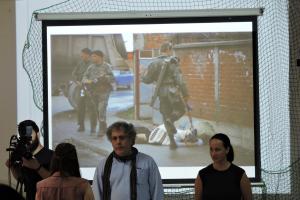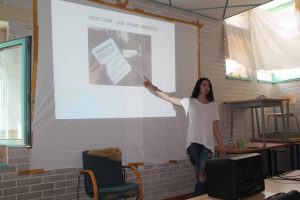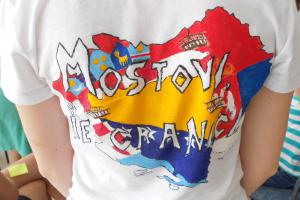
The annual peace camps for youngsters from Serbia, Croatia and Bosnia-Herzegovina

Every summer, around 120 young people between the ages of 14 and 17 from five cities in Serbia, Croatia and Bosnia-Herzegovina meet by the sea, mostly on the Croatian Adriatic in Basko Polje or in Split. For many, it is the first opportunity to meet the “others”: after the ethnic displacement during the wars and the manifestation of ethnic division through the Dayton Peace Treaty, encounters in the daily lives of young people take place little or are shaped by prejudice and hatred. For most of our activists, this two-week long peace camp in summer is the beginning of their engagement with „Youth United in Peace“.
The participants
The selection of participants is done by our partner (organizations). There is no fixed proportion between the ethnic groups represented in the respective countries. The selection criteria depend on the situation in the individual cities: For example, there is a well established group working in Sombor that meets regularly, and those who get involved have the best chances to participate in the camp. From Gornji Vakuf-Uskoplje, where hostility is still a bigger issue than in other cities, young people who are facing hostility in their ethnic community because of their contacts with the „others“ can also participate twice in the camp in order to be supported in their position.
In all five cities, preparatory meetings with the young people as well events for the parents take place. Many parents even today regard meetings between their children and the children of ‚the enemy‘ as problematic.
Program and schedule of the peace camps

Young people get to know each other in casual games easily. For example, if 20 people need to find a space on a tablecloth, this is only possible if everyone is hugging and holding on to each other. Laughing together quickly eases initial reservations and creates sympathy for one another.

Since the beginning of the project, the first core element of the meetings have been various workshops offered by the supervisors of the different groups, e.g. about non-violent conflict transformation, about the different religions or about prejudices and stereotypes. The participants are free to choose them according to their interests, so the group is newly mixed every day. In the afternoons, everyone goes to the beach together and for the non-swimmers we provide a swimming course in the first days.
The most important workshops, which begin when everyone knows each other a little better, are dealing with the war in the former Yugoslavia. This is still a taboo topic in families, although almost all young people have fathers or uncles who fought in the war or female relatives who were affected by (sexualised) violence during the war. “We don’t talk about war. Full stop. End of discussion”, one participant describes this silence. There is little or no discussion about the war in schools, but there are all the more heroic legends about their “own” fighters in all countries, while the blame is always on the „others“. For many young people to speak openly about the war, to be able to ask questions and to discuss together, is liberating. These conversations usually continue at the beach and at night.

For one of these workshops, our partners are using photographs by the US war photographer Ron Haviv. Since some members of YU-Peace met Ron Haviv by chance at the Sarajevo Peace Event in 2014, he has been discussing his experiences during the war and his work with the participants online every summer. In 2017, he was Bosnia for a film project and thus visited the group during the peace camp in Basko Polje, Croatia. The seriousness with which young people deal with the history of their countries impressed him very much.
After the joint discussion about the war has opened, the young people will go more deeply into the topic in the subsequent workshops, but also activism on current political and social issues as well as the question of how young people can become active themselves are part of the program which varies from year to year.

For example, in many years there is an encounter with three former prisoners of war, a Bosnian, a Serb and a Croat. They share their experiences in the prison camps, answer many questions the young people have and call on them to continue on their way to peace. In 2019, Sofija Todorovic from the „Youth Initiative for Human Rights-Serbia“ strongly motivated the youngsters: throughsharing her own commitment to human rights and her activism, she showed how everyone can make a difference.
In this way, a bridge is created between historical events, the current political situation and various possibilities of one’s own political engagement – a particularly important aspect for the young people. In a similar notch, also in 2019, activist Ajna Jusic, joined the peace camp for a workshop and told her own story, which made her an activist herself and introduced her organization „Forgotten Children of War Association“. In the organization women who were raped during the war, together with their children, are committed to openly dealing with the consequences of mass rape and to legally equate the children born from these rapes with the children of war veterans.
In the last workshop, the young people finally discuss how they can pass on their experiences from this encounter in their cities.

Every year, after a few days, the participants choose a slogan for their peace camp, which expresses their shared hope, but also their goals and perspectives, which they also want to convey to the outside world: „Love before flags“, „Different? So what!”, “Stronger than borders” are just a few examples from previous years. They also wear this slogan on self-painted T-shirts during a trip to the nearest town, hand out leaflets and draw attention to themselves and their message through singing or rehearsed performances. The positive reactions of many passers-by and the shared experience of their public performance encourage them to stand up for their goals and raise their voice at home.

“When we walked through Baska Voda with our message of peace, I was able to talk to many passers-by about friendship and the war. We received a lot of support from them, they were all pleasantly surprised that such a project existed. An old lady appealed to our conscience: ‚You boys have to be smarter than us and must not make the same mistakes.‘ This evening was one of the most beautiful in my life!”, shares a former participant.

In their free time, the young people organize football or basketball tournaments, go on a hike together, sit together on the large terrace, sing and talk or organize a disco.
Each evening ends with the „Sastanak“ („meeting“), in which important events of the day are discussed with the entire group, criticism or problems are voiced and participants select the workshops of the next day. These group meetings are facilitated and shaped by the youngsters themselves.
The day officially ends at midnight. However, then the most important part begins. „The actual fraternization takes place in the nights“, say the supervisors, many of whom were once there as participants. The young people are sitting together until late at night, sometimes 20 people crowd into a triple room to talk, sing and just enjoy being together. All of these activities create the feeling of being part of a unique community – in which many want to continue to be active after the peace camp.
One participant describes it like this: “Imagine a huge heart, and it contains all of our names, stories and experiences, all of our love and friendships. And a small part of that heart is in each of us. That’s how I see the project.“
